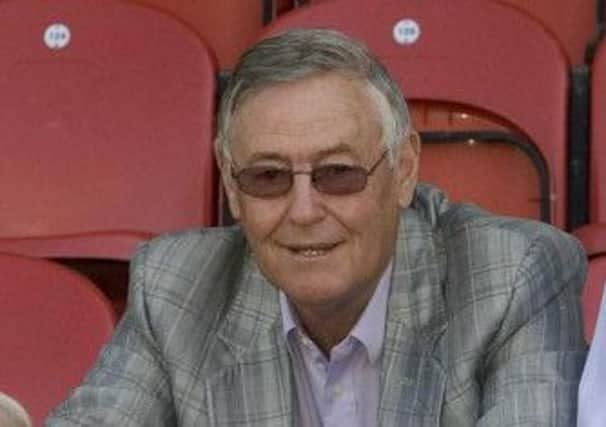Obituary: William “Billy” Carmichael, footballer and chairman


William Carmichael, always known as Billy, was one of the very few footballers who went on to become chairman and owner of the club he once played for, which in his case was Clyde FC.
He also had a second hugely successful career as a market maker and then broker on the Stock Exchange, serving as chairman of the Scottish Exchange in the 1980s and proving an innovative force in the time we now know as the Big Bang.
Advertisement
Hide AdAdvertisement
Hide AdAfter leaving North Kelvinside school in Glasgow, where his prowess at football was first noticed, Carmichael began his working life in trading stocks and shares at the invitation of a friend. His fledgling career was interrupted by National Service, but he was able to resume work in 1953, the same year that he signed for Clyde.
Given the club’s present lowly status in the bottom tier of Scottish football it is often forgotten that Clyde were once one of the major powers in the Scottish game. Nicknamed the Bully Wee, they may never have won the Scottish League title but were a feared Cup team in particular.
Drawing their support mainly from that part of Lanarkshire around Rutherglen, the club played at Shawfield Stadium, and the 1950s was their golden era, at least in the Scottish Cup.
Carmichael made his debut for Clyde against Rangers in March 1953, scoring in a win over the Ibrox side.
Adroit in either the half-back or inside-forward position – what we now call an attacking midfielder – he would go on to play more than 30 games for Clyde, while at the same time developing his career as a “jobber”, the old name for a market maker, on the Stock Exchange, dealing mostly with shares in gold mining.
It was the rule rather than the exception for professional players to have a second job in those days of the maximum wage, and Carmichael’s success on the Stock Exchange soon began to overshadow his career on the pitch – but not before he was part of the famous Clyde squad of 1954-55 that won the Scottish Cup for the Bully Wee.
At that time Clyde had one of the best left-backs in the country, Scotland internationalist Harry Haddock, as well as a forward line that older fans will still remember – Hill, Robertson, Buchanan, Carmichael and Ring. Of that quintet, Robertson and Ring were also capped for Scotland.
Yet in those days when the chairman and directors picked the team, Carmichael was left out of the XI which defeated Celtic after a replayed Final, the first match being the first Scottish Cup Final to be televised, watched by a crowd of 108,000.
Advertisement
Hide AdAdvertisement
Hide AdThe decision to omit him was conveyed by then chairman William P Dunn. His nephew Frank Dunn, himself a former director of Clyde, commented: “They would exchange banter about it for the next 30 years.”
Carmichael himself once recalled the dual nature of his jobs, telling how Clyde manager Paddy Travers summoned him along the team bus.
Fearing bad news, Carmichael was nonplussed to be asked by Travers whether or not he should sell his Marks and Spencer shares.
His playing days set aside, Carmichael went on to become senior partner with Glasgow-based Aitken Campbell and Co, establishing a reputation for integrity and approachability.
While golf became a major recreation for him, football also crossed his path on the Stock Exchange as it was Carmichael who was chosen to successfully conduct the auction of shares in Rangers that brought Jack Gillespie to Ibrox, where he later became vice-chairman.
When the Thatcher government decided to free up controls on the financial services sector in the early to mid-1980s, Carmichael was at his peak and became the first “jobber” to become chairman of the Scottish Stock Exchange, shortly before the distinction between jobbers and brokers was abolished.
He also oversaw the work of Aitken Campbell in such innovations as dealing in privatisation shares and employee share ownership.
Invited to join the board of Clyde FC in 1992, he later became chairman, by which time the club was installed in its present home, Broadwood Stadium in Cumbernauld, though currently there are plans to move Clyde to East Kilbride.
Advertisement
Hide AdAdvertisement
Hide AdIt was no secret that Carmichael spent considerable sums of his own money to keep Clyde afloat when the club had run up considerable historical debts. His greatest disappointment in football came when Clyde, under manager Alan Kernaghan, looked set for promotion to the Scottish Premier League in season 2003-04, only for Inverness Caledonian Thistle to beat them at Broadwood and pip the Bully Wee to the promotion spot.
Being no longer able to sustain the club with his own finances, at the end of that season, Carmichael performed one last service for his club, handing effective control of it to its supporters, despite being offered larger cash sums for his shares.
Thanks to that gesture Clyde FC is now the country’s first Community Interest Company, and is owned by its supporters, as it was when the club was founded in 1870.
Latterly Carmichael lived in Perthshire and suffered ill-health of a neurological nature, like so many players who flourished in that era of heavy leather footballs. He died in Perth Royal Infirmary after suffering a heart attack.
Billy Carmichael’s wife Rose predeceased him, and he is survived by his daughter and grandchildren. His funeral service will take place at Perth Crematorium on Tuesday, 7 January, at 10:30am.
MARTIN HANNAN